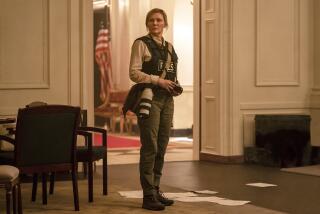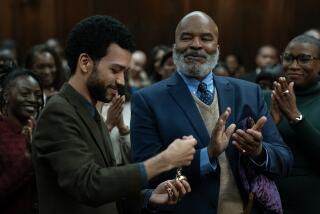Mixed Early Returns
- Share via
In its marketing strategy for “Bulworth,” 20th Century Fox attempted to lay the groundwork for a crossover urban audience that bridged Westwood and Baldwin Hills.
“If any movie can bring the races together to see a film it’s this one,” said Debora Ames, 45, who saw the movie over the weekend at the Magic Johnson Theaters in Baldwin Hills. “I’ve always admired Warren Beatty, but I didn’t know he had it in him.”
But in its first weekend in national release Fox’s strategy delivered mixed results, with Beatty’s film about an over-the-edge U.S. senator finding new life and love in the inner city attracting only limited black audiences.
Beatty’s satire opened to strong reviews and took in more than $10 million on about 2,000 screens. According to the studio, the film is playing best in review-driven markets like San Francisco, New York and Chicago. It played far weaker in suburban and heartland theaters.
And despite the studio and Beatty’s best efforts, young African American males didn’t show up for “Bulworth.” In addition to direct marketing to that audience demographic on television and a best-selling rap soundtrack that has been on the R&B; charts for weeks, Beatty made appearances on TV shows with heavy black male viewership, cable’s BET channel and the syndicated talk show “Vibe.”
The studio also booked as many “ethnic screens as we could get our hands on--about 350 theaters,” says one Fox insider. “But the truth is most theaters today are crossover houses.”
Fox’s national exit polls found that first-weekend business was composed largely of adult white males over the age of 25.
*
But Gerri Walters, a manager at the Magic Johnson Theaters where “Bulworth” is playing on two screens, said the film was doing strong business there. The film grossed approximately $16,000 over the Memorial Day weekend.
Young males may not be flocking to the film but the Memorial Day matinee audience for “Bulworth” at the Magic Johnson Theaters was about evenly divided between African American males and females over the age of 25.
The trailer and the TV spots were mentioned repeatedly by members of the audience as reasons why they came to see the film. And their reaction was largely upbeat. Overall, “Bulworth’s” depiction of urban problems was deemed fairly accurate.
“It reflected the reality from a black perspective and the politics and social economic structure of the inner city, which I’m obviously a part of,” said 47-year-old Freddie Hudson.
The film’s take-no-prisoners lampooning of human frailties--both white and African American--was also fairly well received. A scene in which Sen. Bulworth tells the gathered audience at an inner-city church why politicians ignore their needs is fairly candid. Sean Barrett, 34, however, didn’t find it offensive.
“I thought the church scene set up the rest of the movie,” Barrett said. “It made it look like he [Bulworth] was racist. But in the end he helped black people.”
Cynthia Graham, 38, was not perturbed by the R-rated film’s use of “the word,” which is how she described a particular racial epithet that is peppered throughout “Bulworth.” “You hear ‘the word’ all the time. I didn’t find it offensive and I didn’t see anyone leave. I thought the movie was truthful.”
However, a retired couple who referred to themselves as the Franklins were put off by the film’s profanity, particularly Mrs. Franklin.
“I didn’t care for that at all. And there was so much of it, though it was very current in its political statements.”
Observing ruefully that “it took a major white star to get this film made; no black actor could have gotten it made,” Ben Hill, 45, added, “The film had a lot of excellent insights about a subject that people don’t generally talk about. I’m glad [Beatty] took the risk.”
More to Read
The biggest entertainment stories
Get our big stories about Hollywood, film, television, music, arts, culture and more right in your inbox as soon as they publish.
You may occasionally receive promotional content from the Los Angeles Times.










